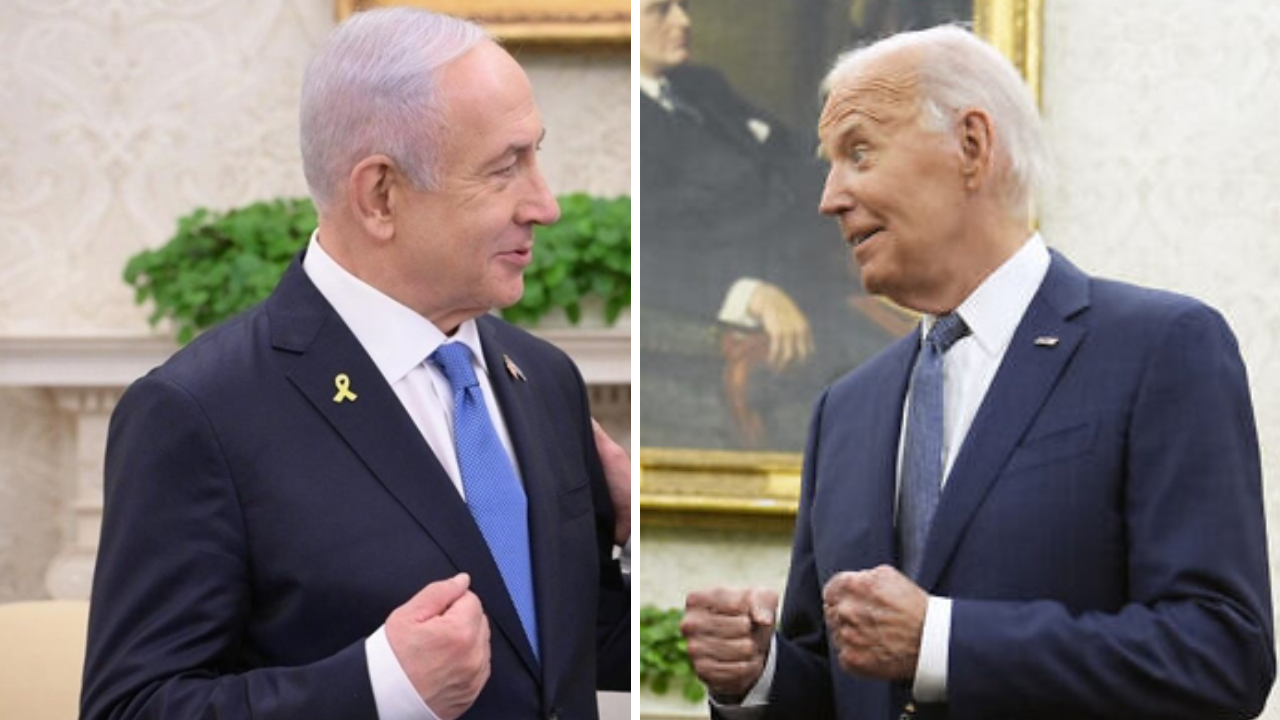[ad_1]
US President Joe Biden reportedly had a blunt exchange with Israeli Prime Minister Benjamin Netanyahu during a phone call, telling him to “stop bullshitting me” as the two leaders discussed the ongoing negotiations for a hostages-for-ceasefire deal with Hamas.
According to a report by Channel 12 news on Saturday, Biden’s frustration boiled over after Netanyahu claimed that Israel was making progress in the negotiations, which have yet to yield results despite months of talks.
The heated conversation reportedly ended with Biden warning Netanyahu: “Don’t take the president for granted.” This comment was made in the context of the two nations’ cooperation amid heightened tensions with Iran and its proxy groups, which have vowed retaliation following the recent targeted killings of several terrorist leaders.
Netanyahu’s office declined to comment on the specifics of the call, stating that the prime minister “does not intervene in American politics and will work with whoever is elected president, and expects the Americans to also not intervene in Israeli politics.”
The New York Times reported that Biden also criticized the timing of the Wednesday assassination of Hamas leader Ismail Haniyeh in Iran, calling it “poorly timed” and arguing that it jeopardized what the US saw as a potential breakthrough in the ceasefire and hostage release negotiations. Biden expressed concerns that the operation could escalate into a broader regional conflict, a sentiment he reiterated during a press conference at Joint Base Andrews on Thursday.
Netanyahu, however, reportedly insisted that Hamas was to blame for the stalled negotiations, a stance his office has maintained publicly.
Adding to the complexity of the situation, The Telegraph cited a senior Israeli official who suggested that Netanyahu has felt more emboldened to act against Iran since Biden’s recent announcement that he would not seek reelection in 2024. The official indicated that Biden’s decision has shifted the dynamics in the Middle East, giving Netanyahu more confidence to confront Israel’s enemies with the expectation of continued US support.
Biden’s decision to withdraw from the 2024 race followed concerns over his age and mental acuity, exacerbated by a challenging debate performance against former President Donald Trump in June. Vice President Kamala Harris, Biden’s likely successor, also participated in Thursday’s call, according to the White House.
The assassination of Haniyeh has further inflamed tensions in the region, with Iran threatening retaliation against Israel, which has not confirmed or denied involvement in the killing. Biden publicly acknowledged the assassination’s impact on the ceasefire negotiations, stating that it “doesn’t help” efforts to secure a truce and the release of hostages held in Gaza.
An Axios report on Friday detailed the Biden administration’s frustration with Israel over being left out of the loop regarding the assassination plans, which occurred after Netanyahu had seemingly agreed to prioritize the ceasefire negotiations during his visit to Washington last week. The report described Thursday’s conversation between Biden and Netanyahu as “tough,” reflecting the strain in their diplomatic relationship amid the ongoing crisis.
According to a report by Channel 12 news on Saturday, Biden’s frustration boiled over after Netanyahu claimed that Israel was making progress in the negotiations, which have yet to yield results despite months of talks.
The heated conversation reportedly ended with Biden warning Netanyahu: “Don’t take the president for granted.” This comment was made in the context of the two nations’ cooperation amid heightened tensions with Iran and its proxy groups, which have vowed retaliation following the recent targeted killings of several terrorist leaders.
Netanyahu’s office declined to comment on the specifics of the call, stating that the prime minister “does not intervene in American politics and will work with whoever is elected president, and expects the Americans to also not intervene in Israeli politics.”
The New York Times reported that Biden also criticized the timing of the Wednesday assassination of Hamas leader Ismail Haniyeh in Iran, calling it “poorly timed” and arguing that it jeopardized what the US saw as a potential breakthrough in the ceasefire and hostage release negotiations. Biden expressed concerns that the operation could escalate into a broader regional conflict, a sentiment he reiterated during a press conference at Joint Base Andrews on Thursday.
Netanyahu, however, reportedly insisted that Hamas was to blame for the stalled negotiations, a stance his office has maintained publicly.
Adding to the complexity of the situation, The Telegraph cited a senior Israeli official who suggested that Netanyahu has felt more emboldened to act against Iran since Biden’s recent announcement that he would not seek reelection in 2024. The official indicated that Biden’s decision has shifted the dynamics in the Middle East, giving Netanyahu more confidence to confront Israel’s enemies with the expectation of continued US support.
Biden’s decision to withdraw from the 2024 race followed concerns over his age and mental acuity, exacerbated by a challenging debate performance against former President Donald Trump in June. Vice President Kamala Harris, Biden’s likely successor, also participated in Thursday’s call, according to the White House.
The assassination of Haniyeh has further inflamed tensions in the region, with Iran threatening retaliation against Israel, which has not confirmed or denied involvement in the killing. Biden publicly acknowledged the assassination’s impact on the ceasefire negotiations, stating that it “doesn’t help” efforts to secure a truce and the release of hostages held in Gaza.
An Axios report on Friday detailed the Biden administration’s frustration with Israel over being left out of the loop regarding the assassination plans, which occurred after Netanyahu had seemingly agreed to prioritize the ceasefire negotiations during his visit to Washington last week. The report described Thursday’s conversation between Biden and Netanyahu as “tough,” reflecting the strain in their diplomatic relationship amid the ongoing crisis.
[ad_2]
Source link

